Does Christianity Preach Fear? p12
Buying Fear (part 1 of 2)
This article is the first of two parts which examines the underlying reasons why people buy fear, and according to the critics, why people buy into fear, especially as it relates to Christianity.
At the beginning of this series, I offered four reasons why I believe the critics claim that Christianity Preaches Fear. They are: Control (previous articles), Money, Intolerance, and finally, that Fear, is not the story of love. In this section we are looking at the issue of money (the buying and selling of fear) and from the previous article, I asked the simple question of; who buys fear? My answer was simple enough: "It doesn't take much thought to realize that people buy fear, because people sell fear”.
What Motivates Buying
I have spent much time looking into the various reasons on what motivates people to buy things and the following list is a summary of twenty reasons that were most commonly mentioned. In no particular order they are: to be liked, to make money, to be secure, to be happy, to gratify curiosity, to save money, to be attractive, to have fun, for convenience, to be right, to save time, to be comfortable, to gain knowledge, out of fear, out of greed, to feel important, to make work easier, to be distinct, to be healthy, to be appreciated. I believe these reasons are a good outline for what many people have listed as the motivation for why people buy certain things. I came across a good article that I felt narrowed this list down into a better summary and will use it as an outline in part two of this article.
"There are six different motives and they are not presented in any special order nor are they any more important than any other". I shall refer to these as the six buying motives. You may notice that all these buying motives are emotional, not logical. People buy emotionally, not logically. They are: "Desire for gain (usually financial), Fear of loss (again, usually financial), Comfort and convenience, Security and protection, Pride of ownership, Satisfaction of emotion". [1]"People buy emotionally, not logically". An interesting concept when it comes to preaching fear, especially concerning Christianity. The question is however, is it true? The answer is of course, yes and no. To demonstrate my point, I will use three examples; 'Left Behind', 'Harry Potter' and the 1973 mega-hit movie 'The Exorcist'.
This article is not intended as review, nor will I offer any opinion. I believe there is enough written from all sides concerning any controversy that surrounds these different stories, depending on which side you stand. My goal is to examine the underlying premise as to why the critics claim that Christianity preaches fear, and why people buy fear. I will comment on the basic principles of these fictional stories and why people are so fascinated by them in the second part of this article, but for now, a quick background of sorts to help determine the differing aspects of these good over evil stories, which seems to me, have become the most sought out literature in the world today. The question of course is; why.
The Left Behind SeriesTyndale House PublishersWithout a doubt, 'Left Behind' has become one of the most popular fiction novels in America today, second only in worldwide sales to the 'Harry Potter' series. Both of these novels carry the same premise of good overcoming evil and both are based within the spiritual, the eternal.
"In the midst of global chaos, Rayford must search for his family, for answers, for truth. As devastating as the disappearances have been, the darkest days may lie ahead. Terror and chaos continues worldwide as the cataclysm unfolds. For those left behind, the apocalypse has just begun.
In this moving novel, Jerry B. Jenkins and Tim LaHaye offer an account of what life might be like for those left behind when millions vanish. Left Behind will intrigue you, entertain you, and challenge you. And when you realize it represents an event that millions believe will actually occur, it could change your life". [2]
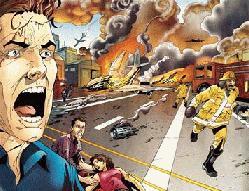 Apocalyptic action: The 'Left Behind' series gives old-time religion a sci-fi twist
Apocalyptic action: The 'Left Behind' series gives old-time religion a sci-fi twistThe 'Left Behind' series is often mentioned to show how Christianity preaches fear. After all, one look at the book titles and cartoon depictions reveals the content of this story; an evil ruler intent on inflicting death and destruction, nuclear holocaust, crashing airplanes, cars, trains, buses and etc, due to born again Christians being taken away in the rapture.
"In one cataclysmic moment, millions of people disappear, throwing the world into instant chaos. Pilot Rayford Steele, journalist Buck Williams, minister Bruce Barnes, and student Chloe Steele all search for the answers, only to discover they are entering the seven-year period called the Tribulation. [2]Not a pretty picture of things foretold to come, according to the Book of Revelation, which is the premise of this best-selling novel.
 A synopsis of the book 'Glorious Appearing, The End of Days' [2]
A synopsis of the book 'Glorious Appearing, The End of Days' [2] "At the battle between the forces of evil at Armageddon and the Christian believers at Petra and Jerusalem, nothing seems to stop the Antichrist, Nicolae Carpathia. But God has another plan".Who is buying the Left Behind series?
"Thousands of years of human history stained by strife, death, and sin come to an end when the King of Glory returns to earth. The satisfying conclusion of the seven years of Tribulation covered by the Left Behind series portrays the return of Jesus Christ to earth in both glory and judgment".
With more than 75 million copies sold, generating more than 650 million dollars in sales since first published in 1995, the Left Behind series of apocalyptic Christian novels, have out sold and surpassed, Stephen King, John Grisham, and every other pop novelist in America. Twelve volumes are now in print: 71 percent of the readers are from the South and Midwest, and just 6 percent from the Northeast. The "core buyer" is a 44-year-old born-again Christian woman, married with kids, living in the South. One in eight Americans read these books about the end of the world. [3]What are the critics saying about this type of fear preaching? The following are some reviews of the Left behind series. I think you will be able to clearly see my point.
Question: "And why are so many people eager to [but these books]"?The Harry Potter Series
Answer: "Well, check the news tonight. As the world gets increasingly scary, with much of the trouble centered in the Mideast — just where you'd expect from reading the Book of Revelation — even secular Americans sometimes wonder (or at least wonder if they ought to start wondering) whether there might not be something to this End Times stuff. After September 11, 2001, there was such a run on the latest "Left Behind" volume, "Desecration," that it became the best-selling novel of the year. And it's no coincidence that the books are a favorite with American soldiers in Iraq. [3]
"In fact, the series is intensely political. Read critically, it provides a window on how theology can drive right-wing activism -- sometimes in bizarre ways, as when vocal supporters of Israel look forward to the conversion or death of the Jews. Read uncritically, the Left Behind books are giving millions of people an interpretive paradigm in which extreme views seem sensible. Propaganda in the guise of fiction, they demand our attention. And to make sense of the politics, we must look at the theology". [4]
"Left Behind, the best-selling series of paranoid, pro-Israel end-time thrillers, may sound kooky, but America's right-wing leaders really believe this stuff". [5]
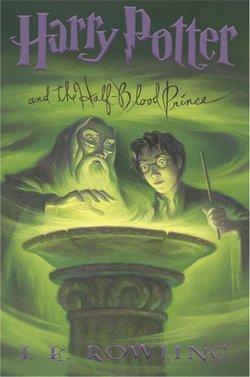 In contrast, the 'Harry Potter' series is not centered around worldwide apocalypse, with humanity consumed in the ultimate nightmarish destruction of what the Bible calls the end of the age, all brought about by an evil ruler known as the Anti-Christ, which in the Christian perspective, is none other than Satan himself. And it is here that the separation of these two stories is based, and yet, both separations reside in what we understand as, the world of the eternal.
In contrast, the 'Harry Potter' series is not centered around worldwide apocalypse, with humanity consumed in the ultimate nightmarish destruction of what the Bible calls the end of the age, all brought about by an evil ruler known as the Anti-Christ, which in the Christian perspective, is none other than Satan himself. And it is here that the separation of these two stories is based, and yet, both separations reside in what we understand as, the world of the eternal.This novel is based on fantasy and the pagan traditions of the magical arts (the curious arts). The magical arts centers on sorcery, encompassing such things as, incantations, charms, spells, portions, fortune telling, astrology, etc. In the bible, sorcery or magic is known as divination.
While 'Left Behind' is loosely based on the prediction of world events to come, according to the Bible, 'Harry Potter' centers on a mythical, magical world of wizards, witches and a host of creatures both good and evil. This story is more or less individual and personal, as Harry Potter is a hero of sorts, and like 'Left Behind' where the hero is Jesus Christ, both of these heros intervene to save mankind from the grips of pure evil. The 'Harry Potter' series follows the same basic premise as other novels and movies which place the hero into the family of humanity, to work out the evil that is caused from the unseen realm of the eternal world, such as Lord of the Rings, The Wizard of Oz, The Matrix, The Chronicles of Riddick, Star Trek, and the X-Files, to name only a small few.
"Harry Potter thinks he is an ordinary boy — until he is rescued by a beetle eyed giant of a man, enrols at Hogwarts School of Witchcraft and Wizardry, learns to play Quidditch and does battle in a deadly duel. All because Harry Potter is a wizard! Follow the adventures of Harry Potter as he discovers the magical, the dangerous, the unpredictable world of Hogwarts School of Witchcraft and Wizardry".
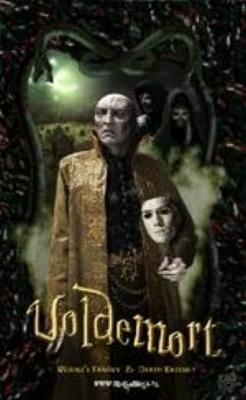
"Harry Potter and the Half-Blood Prince takes up the story of Harry Potter's sixth year at Hogwarts School of Witchcraft and Wizardry at this point as Voldemort's power and followers are increasing day by day, in the midst of this battle of good and evil". [6]And so it is, that Harry Potter is the chosen one, who he alone must fulfill the prophecy of defeating the immortal evil wizard, by casting him into mortality, thus ending the evil force that threatens them all. This is the classical good witch, bad witch story that illustrates the spiritual principles of good and evil, and all that which is right and moral, will always overcome that which is wicked and immoral.
"In Harry Potter and the Half-Blood Prince the entire wizarding population believes Harry to be the 'Chosen One', which is in fact true, because of the prophecy. After Dumbledore's death, Harry decides to shoulder his burden and take it upon himself to destroy the four remaining Horcruxes of Lord Voldemort, objects that contain pieces of Voldemort's soul and will have to be destroyed so that Voldemort becomes mortal. This will be followed by Harry's attempt to finally confront Voldemort himself. He does not shoulder this burden alone, however - Ron and Hermione will be there with him as well, at his side wherever he goes". [7]
Like many works of science fiction and fantasy, the Harry Potter series presents events in the form of analogies with regard to real issues, confronting social issues in an indirect manner. Rowling herself has stated that, rather than intentionally placing themes in her books, she lets them "grow organically". [7]The primary themes mentioned (although not exhaustive) are: choices, love, intolerance, humility and slavery. We will look at these themes in the second part of this article.
"Rowling believes that it is only by letting children experience the real consequences of evil actions that they can understand Harry's moral choices." Readers' Digest, 2000-Dec, p62So, what are people saying about Harry Potter?
The 'Harry Potter' books have provoked various kinds of controversy, mainly accusations of promoting witchcraft and accusations of plagiarism. [7]The Exorcist
"Children who read about Harry will probably discover little to nothing about the true world of the occult." Lindy Beam, Focus on the Family.
"Magic has a universal appeal. I don't believe it in the way that I describe it in my books, but I'd love it to be real." J K Rowling, author of the Harry Potter series
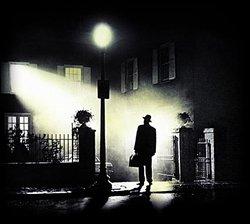 In my opinion, this story [is] the prime example of how fear is sold and how good and evil are portrayed in the world today. This story combines both the 'Harry Potter' and 'Left Behind' series into one, with the emergence of the unseen supernatural entity, entering into the individual human, completely against their will. In this story, the unsuspecting human becomes incarnate with pure evil (Satan) and it is the human (the priest) which must cast this evil out. Unlike ‘Harry Potter’ or ‘Left Behind’, this story of good and evil is played out in the unseen background, while in the foreground, humanity is captured by its very essence. This movie is the classic portrayal of evil if there ever was one.
In my opinion, this story [is] the prime example of how fear is sold and how good and evil are portrayed in the world today. This story combines both the 'Harry Potter' and 'Left Behind' series into one, with the emergence of the unseen supernatural entity, entering into the individual human, completely against their will. In this story, the unsuspecting human becomes incarnate with pure evil (Satan) and it is the human (the priest) which must cast this evil out. Unlike ‘Harry Potter’ or ‘Left Behind’, this story of good and evil is played out in the unseen background, while in the foreground, humanity is captured by its very essence. This movie is the classic portrayal of evil if there ever was one.So, what are people saying about 'The Exorcist'?
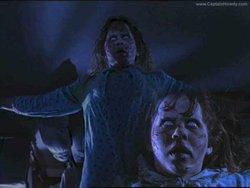 "The Exorcist far surpasses so many films in the history of the horror genre. When the sensationalism of the various stage effects has faded, the questions of faith and family remain. From its inception, author and screenwriter William Peter Blatty was not satisfied in telling a mere campfire tale of shock and suspense, he invested his story with philosophy and characters with purpose. This attention to character nuance gives the story its true power, humanity. Characters struggle with loss and depression, each fighting the seduction of hopelessness". [8]
"The Exorcist far surpasses so many films in the history of the horror genre. When the sensationalism of the various stage effects has faded, the questions of faith and family remain. From its inception, author and screenwriter William Peter Blatty was not satisfied in telling a mere campfire tale of shock and suspense, he invested his story with philosophy and characters with purpose. This attention to character nuance gives the story its true power, humanity. Characters struggle with loss and depression, each fighting the seduction of hopelessness". [8]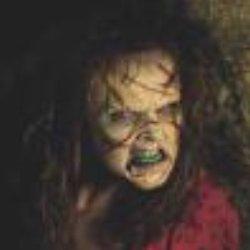 "Never have I seen a film matched in shock, terror, writing, or performances. This isn't a horror movie. The film itself is both a moving and terrifying drama that takes a realistic look at what would actually happen if a young girl were possessed in modern America. William Peter Blatty's script is amazing, bringing depth to the characters, and presenting the mystery of faith that they all deal with. Is Regan possessed? Is she insane? And most importantly, Is there a God? In the course of two hours, we see a sweet and innocent young girl become a head spinning, murderous, creature. We see a successful actress overcome skepticism to save her daughter, and we see a brilliant psychiatrist struggle with his devotion to God as a priest". [8]
"Never have I seen a film matched in shock, terror, writing, or performances. This isn't a horror movie. The film itself is both a moving and terrifying drama that takes a realistic look at what would actually happen if a young girl were possessed in modern America. William Peter Blatty's script is amazing, bringing depth to the characters, and presenting the mystery of faith that they all deal with. Is Regan possessed? Is she insane? And most importantly, Is there a God? In the course of two hours, we see a sweet and innocent young girl become a head spinning, murderous, creature. We see a successful actress overcome skepticism to save her daughter, and we see a brilliant psychiatrist struggle with his devotion to God as a priest". [8]And with this background, I think we are able to grasp an underlying premise and that it is best revealed from the quote above: "This attention to character nuance gives the story its true power, humanity. Characters struggle with loss and depression, each fighting the seduction of hopelessness".
In part two of this article, we will examine the varying examples and see why it is that people are so fascinated by these fictional stories, and why the buying of fear is a matter of perspective, usually based on fantasy and myth.
The subjects that have been mentioned, such as love, intolerance, humility, slavery, loss, depression, the seduction of hopelessness, the consequences of evil actions and moral choices, all relate to our humanity, and ultimately, our spirituality; the mystery of faith. The questions is, are these stories given just to scare us, or is there more to these stories than meets the eye? I believe the answer is both!
[1] To understand your client, know their 'buying motives' by Roy Chitwood, Max Sacks International - Puget Sound Business Journal (June 1-8, 1998)
[2] LeftBehind.com
[3] Religion: The Pop Prophets Newsweek
[4] The Left Behind series Book Review Intolerance: The Bestseller By Gershom Gorenberg
[5] Fundamentally unsound By Michelle Goldberg
[6] Bloomsbury.com
[7] Harry Potter Character Wikipedia.com
[8] The Exorcist Internet Movie Database Inc









0 Comments:
Post a Comment
<< Home